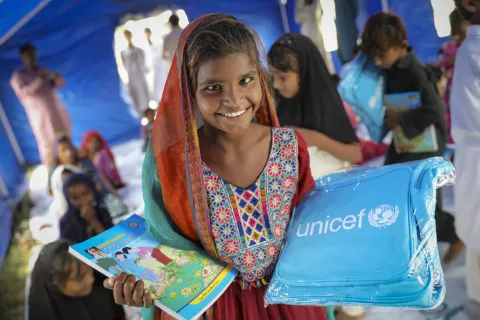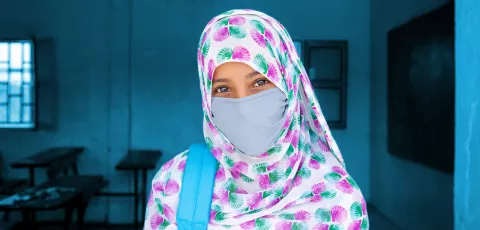Global Annual Results Report 2020: Goal Area 5
Ensuring that every child has an equitable chance in life
Every child has an equitable chance in life
In 2020, the COVID-19 pandemic unleashed an era-defining challenge which has put a sobering spotlight on inequalities in every country, laying bare the increasing risk to children growing up in poverty, exclusion or conflict.
The most harmful effects have fallen on the poorest countries and communities. Those that were already marginalized and disadvantaged by discrimination, social exclusion, fragility, conflict and other crises have slipped even further behind. What began as a public health emergency quickly spiraled into a formidable test for global development and for the prospects of the next generation.
National social protection systems strengthening has been a key focus of UNICEF in 2020 in most countries, including fragile and humanitarian contexts, with the aim to ensure public finance management systems are better equipped to finance social services for children in an equitable and efficient manner. While COVID-19 has reinforced gender inequalities around the world, there is also renewed opportunity to influence positive normative shifts and disrupt gender-discriminatory norms and practices, which cut across all UNICEF goal areas.
Ending child poverty by 2030
1 in 6 children
in the world is living in extreme poverty
Nearly 20% of children under 5
are extremely poor, compared to 7.9% of adults
1.2 billion children
are estimated to be multidimensionally poor, up from 1 billion pre-pandemic

Poverty in childhood has lifelong impacts on a child’s physical, cognitive and social development, with devastating long-term implications for societies. While the last three decades have witnessed unprecedented progress in poverty reduction, in 2020, when the world’s most vulnerable children and families were faced with the rippling socio-economic consequences of COVID-19, this progress saw a complete reversal.
Projections suggest the number of children living in multidimensional poverty may have soared to approximately 1.2 billion as a result of the pandemic.
Child poverty in fragile contexts
While COVID-19 has had fundamental impacts on increasing child poverty, underlying threats of conflict, fragility and climate change are also crucial long-term drivers. About 40 percent of children who live in fragile and conflict-affected countries live in extreme poverty compared to 15 percent of children in other countries. With the impacts of the climate crisis growing, it is projected that two-thirds of those living in extremely poverty will be living in conflict affected and fragile contexts by 2030. Addressing child poverty in these contexts is crucial to prevent a vicious cycle of intergenerational poverty.
UNICEF is working in over 100 countries, including fragile contexts, to support governments to respond to child poverty. Work includes supporting universal national measurement of child poverty in all its dimensions; using policy analysis and engagement to influence policies and programmes to reduce child poverty; and placing child poverty as the highest priority in national development plans and poverty reduction strategies, including a strong focus on expanding coverage and quality of child sensitive social protection systems.
Poverty and Vulnerability in Iraq
In Iraq, UNICEF in collaboration with the World Bank supported the government to generate evidence on the impact of the pandemic on poverty, concluding that 2 out of 5 children were living below the national poverty line, double the rate of 2018.
Public finance for children
In 124 UNICEF country offices
as part of the COVID-19 response, UNICEF worked with governments, development partners and International Financial Institutions to protect and leverage resources for children
In 119 countries
UNICEF country offices engaged with governments in public finance to strengthen the transparency and accountability of social sector budgets
In 96 countries
UNICEF public finance work improved the financing of social protection and education services
UNICEF’s work on Public Finance for Children supports countries to articulate their obligations under Article 4 of the Convention on the Rights of the Child and General Comment No. 19 to ensure social sector budgets are developed and executed with a child rights perspective. This entails helping governments allocate sufficient public resources for sectors and services that are critical for children; improving the efficiency and effectiveness of those resources; distributing them equitably, with special focus on disadvantaged children; strengthening the transparency and accountability of those public financial systems; and promoting citizens participation in budgetary processes.
Making public spending on children’s rights more efficient and effective
The COVID-19 crisis has created major pressure on public budgets and social sector spending as governments faced decreased revenues and increased pressure on spending for pandemic response. Focusing on efficiency and effectiveness of public budgets during the COVID-19 response and recovery has been key to ensure the sustainability of social sector financing. In a total of 124 countries, UNICEF engaged with governments in public finance to strengthen social sector budgets for child rights.
In 113 out of the 124 countries, UNICEF was able to promote efficient and effective investments in social sectors, and supported governments in generating savings in public budgets for redirection to priority social spending with impact on child rights and long-term human development. Evidence generation and engagement with budgetary processes and systems strengthening have been key to influence governments’ spending efficiency in redirecting funds from regressive and inefficient spending towards social spending for children.

Madagascar: Leveraging resources to promote adequate and transparent social spending COVID-19 response and recovery
UNICEF collaborated with the Government of Madagascar and international partners to respond to the COVID-19 crisis while contributing to long-term public finance systems-strengthening related to budget transparency. In response to the COVID-19 pandemic, UNICEF advocacy focused on supporting those most affected by the lockdown through expanded cash transfers for the urban areas most impacted.
Strengthening social protection systems
115 countries
were supported with building inclusive and shock-responsive social protection systems supporting emergency responses
Over 130.7 million children
in 93 countries were reached through UNICEF-supported cash transfer programmes
Over 200 countries
scaled up or initiated over 1,600 social protection programmes, most significantly cash transfer programmes
Social protection, and cash transfers in particular, have been the leading response to the socio-economic impact of COVID-19 with over 200 countries expanding programmes. Despite this progress, only 1 in 3 children has access to a child or family benefit and many expansions during COVID are temporary in nature. Accordingly, UNICEF’s work with governments to strengthen social protection systems, strengthen domestic financing, increasing coverage and working to make programmes more inclusive has never been more important. In 2020 UNICEF supported over 100 countries on social protection, reaching over 130 million children.
UNICEF's support to build social protection systems
Supporting childcare and adolescent employability
UNICEF works towards enhancing quality childcare services and family-friendly policies, particularly for working mothers; and improving access to employment, job-placement and skills-development programmes for adolescents and youth. COVID-19 further increased the care burden on women and adolescent girls given that schools, childcare centres and informal care arrangements were not available due to lockdown measures.

In Ecuador, UNICEF leveraged U-Report to build resilience and adolescent participation through an initiative called DreamLAB, a collaboration with UNDP. Considerable focus was placed on the mental health of children, adolescents and caregivers, as a mechanism to cope with the pandemic and to ensure that the most vulnerable families had access to social protection programmes.
Linking humanitarian cash transfers to social protection systems
Children in fragile and humanitarian contexts face additional vulnerabilities and strengthening social protection in these contexts is particularly important. For the first time, UNICEF has included social protection in its Core Commitments for Children in humanitarian contexts and worked in almost 80 countries to help ensure their social protection systems were shock responsive. Further, UNICEF is committed to delivering humanitarian cash transfers where government systems are not able to scale up - and doing so in ways that support the development of national systems. The number of UNICEF country offices adopting gender objectives for their social protection work tripled.
Promoting positive gender norms and socialization
49 UNICEF country programmes
carried out interventions to confront gender-discriminatory roles and norms and promote positive gender socialization
An estimated 2.6 million mothers, fathers and caregivers
across 87 countries reached with UNICEF-supported parenting programmes
42 per cent of countries (52)
have gender-responsive education systems, compared to 38 per cent in 2019
In 2020, the year of the 25th anniversary of the Beijing Declaration and Platform for Action the COVID-19 pandemic threatened to undermine years of progress made towards gender equality. Against this background, 49 UNICEF country programmes across all regions carried out interventions to confront gender-discriminatory roles and norms and promote positive gender socialization including in the pandemic context, which saw reinforced discriminatory stereotypes and deepened pre-existing inequalities in homes and workplaces.
UNICEF redoubled efforts to increase awareness among parents, children and communities through online platforms to emphasize gender-responsive parenting support and social norms and behaviour change interventions. An estimated 2.6 million mothers, fathers and caregivers across 87 countries were reached through UNICEF-supported parenting programmes. In 46 countries, UNICEF supported governments to strengthen policies, investment, business practices and public-private sector collaboration on four key areas: parental leave; support for exclusive breastfeeding for six months; affordable, accessible quality childcare; and provision of child benefits and adequate wages.
Countries that received gender thematic funding for promoting positive gender norms and socialization
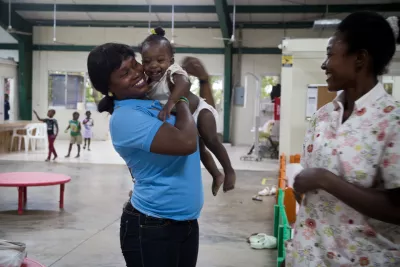
Family-friendly policies
Jean Anne, is one of 147 children, from newborn to 6 years, who are taken care of at the CODEVI textile factory’s childcare centre while their parents are at work. The factory encourages mothers to take breastfeeding breaks to support their children’s health and development. UNICEF increased support for family-friendly policy interventions in 2020, accelerating engagement with the private sector to promote family-friendly policies (FFP), including paid parental leave and flexible working arrangements to alleviate the burden of care on women and to support work and family life balance.
UNICEF continued to support countries to improve the gender-responsiveness of their teaching and learning systems, contributing in 2020 to 42 per cent of countries (52) having gender-responsive education systems, compared to 38 per cent in 2019. Through programmes to address child marriage, UNICEF challenged gender norms that underlie harmful practices and nearly six million adolescent girls were reached with prevention and care interventions - 300,000 more than in 2019. UNICEF also worked with private sector partners to influence gender norms at scale by addressing gender stereotypes in media and advertising.
Supporting children with disabilities to reach their full potential
2.2 million children with disabilities
across 144 countries reached with UNICEF disability-inclusive development and humanitarian programmes
Over 152,000 children
provided with assistive technology (AT) and accessible products, exceeding the 2021 target of 95,200
In emergency contexts
44 per cent of UNICEF country offices systematically included children with disabilities in their response efforts
Approximately 820,000 persons with disabilities
were reached with safe water and 350,000 with basic sanitation
Globally, at least 1 in 10 children has a disability and 80 per cent live in developing countries. Children with disabilities are one of the most excluded and marginalized groups and often face multiple challenges in realizing their human rights with many kept hidden at home and subject to neglect, exploitation and violence. Almost 50 per cent of children with disabilities are out of school and in some countries up to 60 per cent of institutionalized children have disabilities.
COVID-19 exacerbated barriers faced by children with disabilities to access basic services and life-saving information, including barriers in accessing handwashing facilities (due to inaccessibility of facilities and/ or physical impairments) and in accessing information about COVID-19 and prevention measures.

Furthering inclusive education
Disability-inclusive education means that all children and adolescents with disabilities can enjoy their right to education on an equal basis with their peers. UNICEF works with partners to promote accessible and inclusive learning spaces and materials. More importantly, it works with teachers and school administrations to promote inclusive attitudes and a mindset of support for all children. In 2020, UNICEF worked in 115 countries to strengthen laws, policies and plans to support inclusive education.

Improving access to water and sanitation for children and adults with disabilities
In Uganda, UNICEF supported improvements to WASH infrastructure in 65 schools across the country, including construction of a five-stance disability-friendly exclusive toilet block for girls with a menstrual hygiene management system (incinerator and changing room with shower) and a mass handwashing system supported by a solar-powered uninterrupted water supply system.
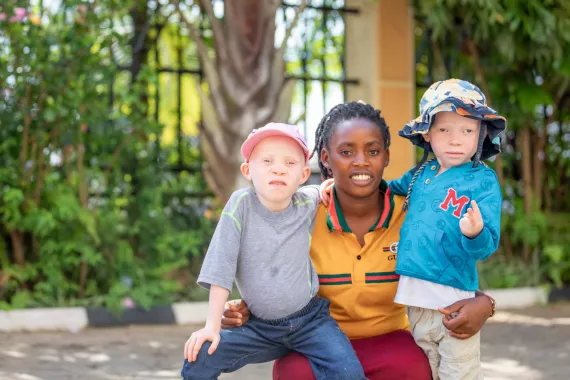
Reducing stigma and invisibility through advocacy and communication
Stigma and discrimination are key barriers to inclusion of girls and boys with disabilities. UNICEF works to transform attitudes and social norms around disability to support the full inclusion of children with disabilities in society. The COVID-19 crisis shifted many priorities and created an urgent need for inclusive Risk-Communication and Community Engagement (RCCE).
Rwanda
Nigeria
Supporting adolescents to engage in shaping their future
7.7 million children
over 3.2 million girls – participated in UNICEF-supported skills development, empowerment and employability training programmes
61 countries
supported to institutionalize gender-equitable approaches to skills development within training systems to ensure all children have equal opportunities
760,000 adolescents
engaged in climate change solutions

The impact of the COVID-19 pandemic on adolescents ages 10 to 19 years further exacerbated existing vulnerabilities and inequalities in 2020. The past year has seen an increase in adolescents who are hungry, isolated, and facing violence; as well as those who face deep economic hardship.
Adolescents are a crucial resource towards a more equal, peaceful and sustainable world. Throughout history, civically engaged young people have been a powerful force for change.To safeguard this contribution and protect young people’s participation, the United Nations Convention on the Rights of the Child Article 12 enshrines the right of every child to express their views freely in matters affecting them and for these views to be taken seriously.
Building skills and capacities of adolescents
UNICEF approaches skills-building by strengthening systems to integrate life skills into education systems, using community platforms to reach the most disadvantaged, working with adults to support adolescents and young people, applying experiential and innovative approaches, and using digital platforms.
YuWaah - Generation Unlimited India
YuWaah is the Indian chapter of UNICEF’s youth initiative - Generation Unlimited. By focusing on engagement, learning, skill development and employment of young people, YuWaah supports a generation of empowered young change makers. In 2020 YuWaah reached 20 million young people with career guidance, engagement and other opportunities through various initiatives and partnerships.
Looking forward
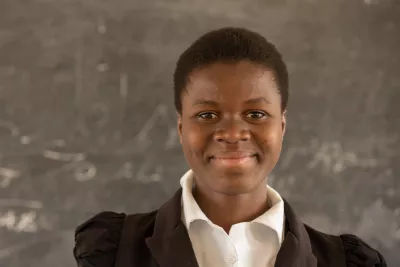


UNICEF will define its next Strategic Plan in 2021 addressing the impacts of the COVID-19 pandemic while contributing to accelerate the commitments under Agenda 2030. Specifically, the new Strategic Plan will deepen our unique comparative advantage in promoting and strengthening inclusive systems, while also scaling up innovative approaches and partnerships to ensure an inclusive and sustainable recovery for every child.
With thanks
This report highlights the achievements made possible by the generous contributions of softly earmarked thematic funding received from various partners. UNICEF would like to express it's sincere appreciation for these contributions.
Highlights
Seventy-four years after UNICEF was established and 31 years since the adoption of the Convention on the Rights of the Child, the organization’s mission to promote the full attainment of the rights of all children is as urgent as ever.
The UNICEF Strategic Plan 2018-2021 is anchored in the Convention on the Rights of the Child and charts a course towards attainment of the Sustainable Development Goals and the realization of a future in which every child has a fair chance in life. It sets out measurable results for children, especially the most disadvantaged, including in humanitarian situations, and defines the change strategies and enablers that support their achievement.
Working together with Governments, United Nations partners, the private sector, civil society and with the full participation of children, UNICEF remains steadfast in its commitment to realize the rights of all children, everywhere, and to achieve the vision of the 2030 Agenda for Sustainable Development, a world in which no child is left behind.
This report summarizes how UNICEF and its partners contributed to Goal Area 5 in 2020 and reviews the impact of these accomplishments on children and the communities in which they live.





